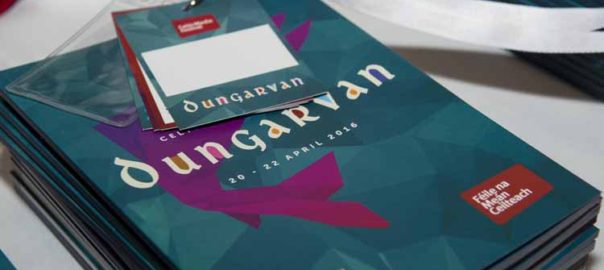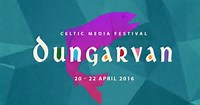During this year’s Celtic Media Festival in Dungarvan I was on a panel about factual tv. I took immediate issue with the assumption behind the session’s brief – The most prolific and successful genre in the Celtic nations is factual, both in English and in the indigenous languages. Is factual prolific and what is the measure of success? But further, I question the festival’s decision to ignore the biggest challenge to the factual genre – adequate media policy.

Festival Programme – Get Your Facts Straight
The most prolific and successful genre in the Celtic nations is factual, both in English and in the indigenous languages. What are the creative and practical challenges facing factual producers in these nations to get their work picked up by network channels and internationally? What are the ingredients which make a documentary or factual series both a ratings and international sales hit? And what is the ideal business model for factual indies operating in the Celtic countries?
Session chair, David Harron (Executive Producer, Commissioning, BBC Scotland) made the fair point that documentary can be a relatively cheap medium, particularly at entry level, therefore a high number of docs results, especially in the indigenous languages, so I accept ‘prolific and successful’ on that basis. However I maintain that, on closer examination, in Wales certainly, ‘prolific’ documentary is not.
My fellow panellists, Jacqui Hayden and Seán Ó Cualáin and I were in broad agreement about the challenges to documentary in general but the most interesting aspect of the discussion was on the politics of broadcasting.
Any industry needs the support of enlightened and well-informed policy if it’s to be productive and sustainable. One of the biggest challenges to documentary is precisely in that policy area. It is policy that sets the terms in which people think about the ‘product’. In the UK, documentary production is inevitably affected by the Centre/Periphery relationship – in the area of commissioning, for example. Who has power and who does not? This dynamic is not confined to the UK. Ask any producer working in a minority language.
It was a great disappointment to me that in this year of BBC Charter Renewal and of much debate around the future of S4C the Festival had no session devoted to the politics behind all the work that broadcasters do. The BBC alone has huge influence on broadcasting in the indigenous languages of the UK and its relationship with S4C is crucial. If ever there was a time for Celtic Media to spotlight their own future in the UK, this would have been it.
The policy future of Irish media is about to be scrutinized too. It would not have required a great stretch to extend discussion beyond Ireland to the other Celtic regions.
The Festival would have been an ideal chance to share perspectives and experience with a view to raising the bar on what is possible to expect from politicians and producers. In fact this linking up of Celtic perspectives is urgently needed in the current UK debates.
Scotland, Northern Ireland and Wales are grappling with how to develop their media industries. In Wales, for example, S4C is looking ahead to a crucial review. We’ve had (2 March) a cross-party report on BBC Charter Review from AMs of the last Assembly which shows unanimity about what is needed for the future. The Welsh Government responded on 1 April. These deliberations turn into finance, slots, access – or the lack of them. They affect the real world in which we work.
Documentary-makers may complain about the vagaries of commissioners or lack of access to network but it is politics that effects real change in these apparent intangibles. Politics changes attitudes and then behaviour. Mere complaint does not. Where there is a will there can be a way. Politics crystallizes the will and finds the way.
The Festival is “an annual 3 day event that promotes the languages and cultures of the Celtic Nations and Regions in media”. This promotion is its raison d’etre. Certainly it showcases quality but I would suggest that this year promotion could have included a message from the Festival to politicians. The Culture Ministers from Northern Ireland, Scotland and Wales have not been slow to claim common ground around Charter review:
There is a clear belief that the shared interests of the devolved administrations must be championed vigorously during the ongoing discussions surrounding the future shape and output of the BBC.
The Celtic Media Festival is a bold claim to shared interests but what message ( other than the important one of quality achieved) has it sent out beyond the Celtic media ‘world’ about the current pressures on those languages and cultures it promotes? Take this, from the UK Government’s Green Paper on BBC Charter Renewal:
while the BBC and licence fee funded services are clearly an important pillar for indigenous language communities there are also challenges: audience reach has been falling across some indigenous language services over the last few years, particularly in Wales. And these services come at a cost; cost per hour of indigenous language radio content in Scotland and Wales is considerably higher than cost per hour for English speaking content which raises concerns about value for money.
On 4 May Northern Ireland’s Department of Culture, Arts and Leisure (Dept. of Communities as of 9 May) issued a robust ministerial position paper about Charter Renewal, presumably looking ahead to the White Paper due on 12th May:
the challenges facing society in North of Ireland create the greatest demand for the public purposes interventions that the BBC can deliver.
In a section on indigenous languages the paper calls for the BBC to:
seek to make formal links between TG4 and MG Alba/BBC Alba in pursuit of better minority and indigenous language provision.
There is no hesitation there about making links across state boundaries and isn’t this what the Festival actually aims to do, on an even wider scale?
No one encountering the vitality, deep engagement and craft skill in the Festival’s short-listed works could fail to want to see more of the places and people represented. It is politics that will enable that to happen – speaking as someone in a country whose people seldom see themselves represented beyond their national borders.
When the Festival began nearly 40 years ago it was a radical statement of faith in Celtic capacity. It helped to change the way people thought and what they expected. It continues to have that role so I look forward to next year and what that will bring.

